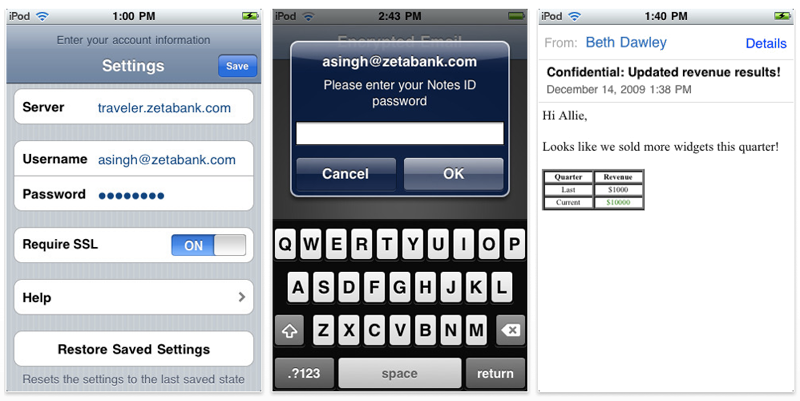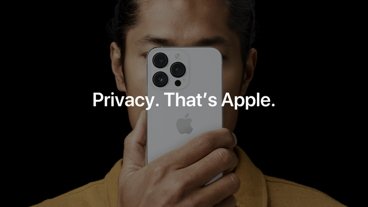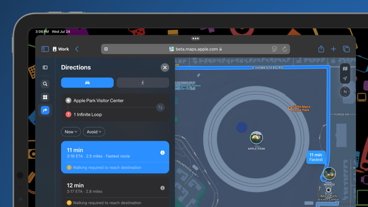IBM plans Lotus for Apple iPad, e-reader eye strain explored
IBM planning Lotus for iPad
IBM Lotus Notes Traveler Companion was released for the iPhone and iPod touch last month. And this week at the Macworld 2010 expo in San Francisco, the company also announced Lotus Connections for social networking inside companies and Lotus Quickr for sharing documents would be coming to the iPhone.
An IBM official told Forbes that the company not only wants to reach out to the small-but-growing number of iPhone users in the enterprise, but also use the new applications as a starting point from which to build App Store software for the forthcoming iPad.
"Our customers are looking at the iPad and they're excited about it," said Alstair Rennie, IBM's manager of Lotus software. "No one quite knows its use patterns yet, but it's our intention to deliver as much of our portfolio as possible on it as fast as possible."
The applications from the corporate collaboration software will be designed specifically for use on the iPad, and are planned to see release sometime near the debut of the hardware, scheduled to arrive in late March. Rennie said IBM expects the iPad to be popular among executives who plan to use the device for both personal and business purposes.
"Peoples' lives don't segment neatly between work and home," he reportedly said. "The iPad gives people what will probably be a home device, but they're still going to want to access a full suite of business software on it."
The news follows comment from Microsoft officials who said the software giant is considering the possibility of bringing its Office suite to the iPad. Apple has already revealed multi-touch version of Numbers, Pages and Keynote — all part of its iWork suite — are coming to the hardware.
Sources have also told AppleInsider that Apple intends to target business users by offering added features on the iPad, including direct network printing from within applications and support for accessing shared files from a local file server.
iPad eye strain explored
While conventional thinking suggests e-ink readers like the Amazon Kindle and its black-and-white display are easier on the eyes, a new article from The New York Times suggests LCD panels, like on Apple's iPad, may be no better or worse.
Dr. Travis Meredith, chair of the opthalmology department at the University of North Carolina, Chapel Hill, said such screens are not bad for peoples' eyes, but physical fatigue can come from not blinking often enough. And while paper can offer more "physical sophistication" than a computer screen, certain types of paper — like cheap newsprint or paper in softcover books — is actually said to be an inferior reading experience.
The article also notes that current LCD monitors offer much better viewing angles and superior clarity to those of years ago. They are also less tiring on peoples' eyes.
The biggest problem for the iPad, the article notes, might be its reflective glass screen, which could prove to be an issue in brightly lit situations. Apple has encountered the same issue with its MacBook Pro line, where it converted to glossy screens that can be difficult to view in direct sunlight. Last August, the Mac maker began offering matte screens for $50 extra on the 15-inch MacBook Pro line.
The iPad has a 9.7-inch LED-backlit screen that employs IPS technology for its LCD display. The technology, developed by Hitachi in 1996, offers improved viewing angles over traditional LCD.
The device will mark Apple's entrance into the e-book market, with the new iBooks application and its included iBookstore offering bestselling titles from some of the top publishers in the world.
 Slash Lane
Slash Lane














 Amber Neely
Amber Neely
 Thomas Sibilly
Thomas Sibilly
 AppleInsider Staff
AppleInsider Staff
 William Gallagher
William Gallagher
 Malcolm Owen
Malcolm Owen
 Christine McKee
Christine McKee









140 Comments
The news follows comment from Microsoft officials who said the software giant is considering the possibility of bringing its Office suite to the iPad. Apple has already revealed multi-touch version of Numbers, Pages and Keynote -- all part of its iWork suite -- are coming to the hardware.
[ View this article at AppleInsider.com ]
This is telling. Gates' recent comments about how little he thinks of the iPad are undercut by his company's decision to offer Office for it. They are obviously fearful that wide iPad adoption with free iWorks will cut into their software hegemony. Actions speak louder than words. They fear the iPad will be very successful and are hedging their bet.
IBM planning Lotus for iPad
I think that business is really going to like the iPad.
... While conventional thinking suggests e-ink readers like the Amazon Kindle and its black-and-white display are easier on the eyes, a new article from The New York Times suggests LCD panels, like on Apple's iPad, may be no better or worse. ...
Just as I've always maintained (and been criticised for saying here a few times), there is really no evidence that "eye strain" is caused by reading from a screen as opposed to paper, or that ePaper is any easier on the eyes than an LCD. It's basically a popular misconception.
This is telling. Gates' recent comments about how little he thinks of the iPad are undercut by his company's decision to offer Office for it. They are obviously fearful that wide iPad adoption with free iWorks will cut into their software hegemony. Actions speak louder than words. They fear the iPad will be very successful and are hedging their bet.
Well, for starters, the iPad is not competing with any Microsoft product so far. And even if Bill does not like the iPad, it would still be stupid for his software company not to cater for the iPad.
This is telling. Gates' recent comments about how little he thinks of the iPad are undercut by his company's decision to offer Office for it. They are obviously fearful that wide iPad adoption with free iWorks will cut into their software hegemony. Actions speak louder than words. They fear the iPad will be very successful and are hedging their bet.
Even for hardcore Mac users iWorks can't even come close to cutting into Office for Mac.